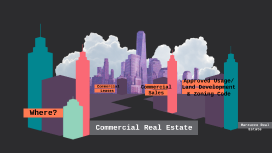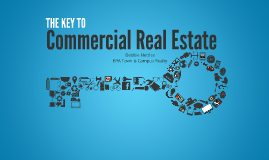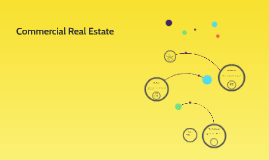Commercial Real Estate
Transcript: Commercial Real Estate 101 Uses include Warehouse Storage, Light and Heavy Manufacturing, Shipping and Distribution, Automotive, etc. Tenants place heavy emphasis on a location’s feasibility: Other occupying uses in the immediate and surrounding area, ease of access, proximity to highways and railways, etc. like office, Industrial properties may also be ranked by Class, however more importantly, they are classified by allowed use. Just because a property is zoned Industrial DOES NOT mean that any industrial use may occupy it. Emphasis must be placed on allowed uses. Basic Definitions and terms in commercial leasing The terms associated with Commercial Leases mostly refer to who's responsibility it is to pay certain expenses: The Landlord -OR- The Tenant. Triple Net (NNN): In addition to the Base Rent, Triple Net leases identify the Tenant as the responsible party for ALL Expenses including: Property Insurance, Property Taxes, C.A.M., Utilities, and Other Maintenance including the Roof. The tenant is also responsible for obtaining their own insurance. Double Net (NN): In addition to the Base Rent, Double Net leases identify the Tenant as the responsible party to the Property Taxes and Building Insurance. Tenant is still responsible for their utilities and personal insurance. Single Net (N): In addition to the Base Rent, Single Net leases identify the Tenant as the responsible party to the Property Taxes. Tenant is still responsible for their utilities and personal insurance. Modified Net: Can have a variety of meanings and interpretations- Always ask for clarification. Typically means that it is a "NNN" Lease where 1 or more of the expenses is paid by the landlord. Gross Lease: A lease where the Landlord is responsible for paying Property Taxes, Building Insurance, and C.A.M. Gross leases may or may not require the tenant to pay utilities. Modified Gross: Typically, the tenant pays only base rent on year 1 of the lease, the landlord pays all other Expenses as is with a Gross Lease; However, the Tenant is responsible for paying any increases for Taxes, Insurance, etc. over the base. C.A.M.: Common Area Maintenance. Charged to a Tenant for their pro-rata share of the Maintenance and utilities of the Common Areas. i.e. Hallways, Lobby, Outdoor Walkways, etc. Annual Increases: The Percentage which the Base Rent Increases (Typically Annually) May be a set percentage or an adjustable index such as CPI. C.P.I.: Consumer Price Index. The CPI measures the average change in the prices paid for a market basket of goods and services. These items are purchased for consumption by the two groups covered by the index: All Urban Consumers (CPI-U) and Urban Wage Earners and Clerical Workers, (CPI-W)* Pass-Thru Expenses: Any Expense incurred by a Landlord that is passed-thru to a tenant: i.e. Taxes, Insurance, Utilities, etc. Percentage Rent: A lease condition that grants the Landlord a percentage of "Profit Sharing". Typically reserved for Retail Tenants. Useable Square Footage: Usually Referred to as the "Carpetable Area" - The area a Tenant can actually use. VS. Rentable Square Footage: A measurement based on B.O.M.A. Standards that uses an add-on factor to compensate for losses within a given space: i.e. Interior Walls, Pillars, Intrusions through the Floor, etc. Qualifying Tenants & Landlords Qualifying Commercial Tenants and Landlords is just as important as it is in Residential. We will now discuss a few of the initial questions that should ALWAYS be asked: Tenants: What type of space are they looking to Lease? What are they looking to do with the Space? Have they ever run this type of business before? IF SO- Where are their existing/former locations? How long have you been in business? Do you have any partners? IF SO- Who is the decision maker? LET THEM KNOW THAT WE ONLY DEAL WITH ONE POINT OF CONTACT - THIS HELPS TO AVIOD CONFUSION. Have they ever leased/purchased Real Estate? Have they ever had a Real Estate professional represent them? What is their budget? Does their budget include expenses? Do they understand the various types of leasing and terms associated with Commercial Leasing. When are they looking to move-in? Landlords: What type of space do they have available for Lease? What type(s) of Tenant are they looking for? Are there any type(s) of Tenant they do NOT want? Do you have any partners? IF SO- Who is the decision maker? LET THEM KNOW THAT WE ONLY DEAL WITH ONE POINT OF CONTACT - THIS HELPS TO AVIOD CONFUSION. Have they ever been a Commercial Landlord? Have they ever had a Real Estate professional represent them? Do they have a price in mind they are looking to get for Rent? Does their price include expenses? Do they understand the various types of leasing and terms associated with Commercial Leasing. When will the space be ready for move-in? How will the space be delivered? NEVER DISTRIBUTE, SIGN, OR ENTER INTO ANY AGREEMENT OR CONTRACT WITHOUT FIRST SPEAKING WITH AND RECEIVING AUTHORIZATION FROM

















